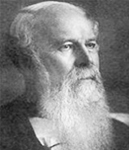
The Word Made Flesh I
J.C. Ryle
The main truth that this verse teaches is the reality of our Lord Jesus Christ’s incarnation, or being made man. St. John tells us that “the Word was made flesh, and dwelt among us.” The plain meaning of these words is that our divine Savior really took human nature upon Him in order to save sinners. He really became a man like ourselves in all things, sin only excepted. Like ourselves, He was born of a woman, though born in a miraculous manner. Like ourselves, He grew from infancy to boyhood, and from boyhood to man’s estate, both in wisdom and in stature (Luk 2:52). Like ourselves, He hungered, thirsted, ate, drank, slept, was wearied, felt pain, wept, rejoiced, marveled, was moved to anger and compassion.
Having become flesh and taken a body, He prayed, read the Scriptures, suffered being tempted, and submitted His human will to the will of God the Father. And finally, in the same body, He really suffered and shed His blood, really died, was really buried, really rose again, and really ascended up into heaven. And yet all this time He was God as well as man!1
This union of two natures in Christ’s one person is doubtless one of the greatest mysteries of the Christian religion. It needs to be carefully stated. It is just one of those great truths that are not meant to be curiously pried into, but to be reverently believed. Nowhere, perhaps, shall we find a wiser, more judicious statement than in the second article of the Church of England. “The Son, which is the Word of the Father, begotten from everlasting of the Father, the very and eternal God, and of one substance with the Father, took man’s nature in the womb of the blessed virgin of her substance: so that two whole and perfect natures, that is to say, the Godhead and the manhood, were joined together in one person, never to be divided, whereof is one Christ, very God and very man.”2 This is a most valuable declaration. This is “sound speech, that cannot be condemned” (Ti 2:8).3
But while we do not pretend to explain the union of two natures in our Lord Jesus Christ’s person, we must not hesitate to fence the subject with well-defined cautions. While we state most carefully what we do believe, we must not shrink from declaring boldly what we do not believe.
We must never forget that though our Lord was God and man at the same time, the divine and human natures in Him were never confounded.4 One nature did not swallow up the other. The two natures remained perfect and distinct. The [deity] of Christ5 was never for a moment laid aside, although veiled. The manhood of Christ, during His lifetime, was never for a moment unlike our own, though by union with the Godhead, greatly dignified. Though perfect God, Christ has always been perfect man from the first moment of His incarnation. He that is gone into heaven and is sitting at the Father’s right hand to intercede for sinners is man as well as God. Though perfect man, Christ never ceased to be perfect God. He that suffered for sin on the cross and was made sin for us was God manifest in the flesh (1Ti 3:16). The blood with which the Church was purchased is called the blood “of God” (Act 20:28).
Though He became flesh in the fullest sense, when He was born of the Virgin Mary, He never at any period ceased to be the Eternal Word. To say that He constantly manifested His divine nature during His earthly ministry would, of course, be contrary to plain facts. To attempt to explain why His Godhead was sometimes veiled and at other times unveiled, while He was on earth, would be venturing on ground that we had better leave alone. But to say that at any instant of His earthly ministry He was not fully and entirely God is nothing less than heresy.
1. See FGB 219, The Person of Christ, available from CHAPEL LIBRARY.
2. Book of Common Prayer (1662), Articles of Religion, II.
3. EDITOR’S NOTE: We endorse the use of confessions as helpful statements of biblical doctrine; but they are fallible works of men, not the authoritative, infallible Word of God.
4 confounded – mixed up or mingled so that the elements become impossible or difficult to distinguish.
5 See FGB 230, The Deity of Christ, available from CHAPEL LIBRARY.
All Rights Reserved. Used with permission by Chapel Library. No part of this article may be used or reproduced in any manner whatsoever or translated without written permission.

